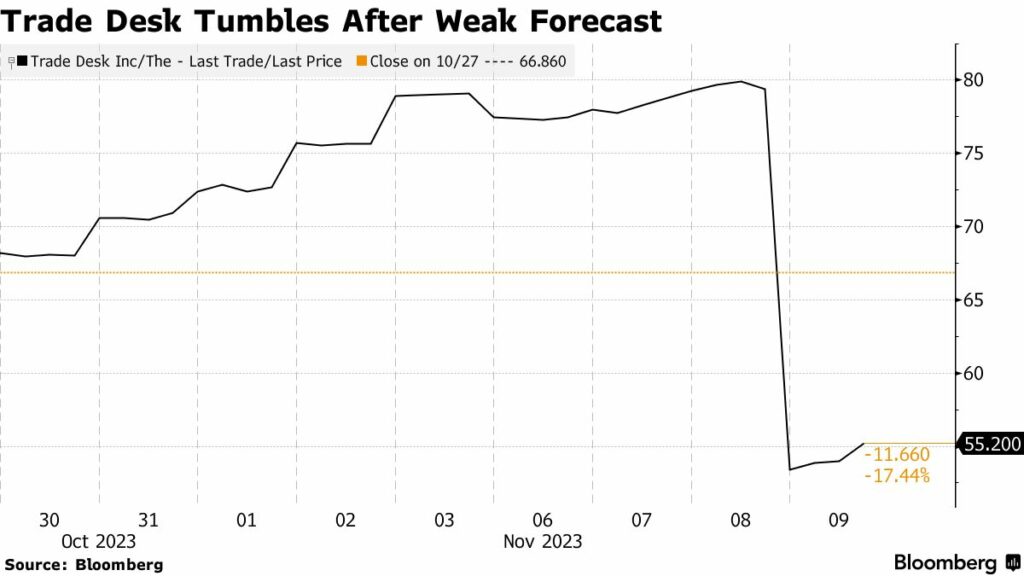In a recent Bloomberg article titled “Trade Desk’s 31% Plunge Sends Warning on Ad Market, Economy,” a pivotal moment in the advertising industry is brought into sharp focus. The article details the significant drop in Trade Desk’s stock value and its broader implications on the ad market, affecting key players like Meta, Snap, and Pinterest. This shift signals a critical juncture for advertising CEOs, who must now navigate a landscape rife with economic uncertainties and evolving market dynamics.
Drawing from the insights and data presented in this Bloomberg piece, this blog post aims to guide advertising CEOs through these turbulent times. By dissecting the factors contributing to this market shake-up and offering strategic responses, we seek to equip industry leaders with the tools and perspectives necessary to adapt and thrive in a rapidly changing environment.

The recent plunge in Trade Desk’s stock price and its weak revenue forecast for the current quarter has sent shockwaves through the advertising industry. This bearish sentiment has also affected other major players like Meta, Snap, and Pinterest, raising concerns about the overall health of the ad market.
As advertising CEOs, it’s crucial to stay abreast of these developments and proactively navigate the challenges they present.
Here are some key takeaways to consider:
- Economic Pressures Weighing on Ad Spending: The current economic climate is undoubtedly impacting advertising budgets. Businesses across various sectors, such as the auto industry and consumer electronics, are tightening their spending, particularly in areas like cell phones and media and entertainment.
- Brand Advertisers Showing Caution: Brand advertisers are exhibiting a degree of caution due to global events like the Israel-Hamas war, leading to a temporary decline in ad spend. This highlights the need for resilience and adaptability in our strategies.
- Macroeconomic Factors Drive Volatility: As Meta’s CFO Susan Li aptly stated, the ad market is highly susceptible to fluctuations in the macroeconomic landscape. We must be prepared to adapt our strategies and expectations accordingly.
Adapting to the Shifting Landscape
In light of these uncertainties, advertising CEOs should consider implementing the following strategies:
- Diversify Client Base and Ad Platforms: Diversifying our client base and utilizing a broader range of ad platforms can help mitigate the impact of any single client or platform experiencing challenges.
- Focus on Performance-Based Advertising: Emphasize performance-based advertising models, where advertisers pay only for measurable results, such as conversions or sales. This aligns with the need for accountability and measurable ROI.
- Embrace Innovation and Technology: Continuously invest in innovative technologies and data-driven approaches to enhance campaign effectiveness and optimize ad spend.
- Communicate Transparency and Build Trust: Maintain open and transparent communication with clients regarding market trends and potential challenges. Building trust and fostering strong partnerships will be essential.
- Monitor Macroeconomic Indicators: Stay informed about key macroeconomic indicators that could impact ad spending, such as consumer confidence, inflation, and economic growth projections.
The advertising industry is undoubtedly facing a period of uncertainty, but it also presents an opportunity for those who can adapt and innovate. By embracing these strategies and remaining vigilant, advertising CEOs can navigate these challenges and position their businesses for long-term success.


